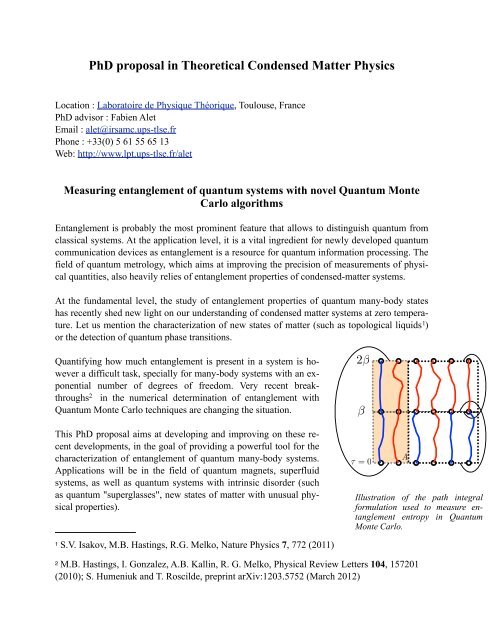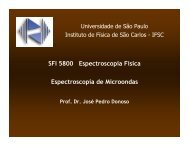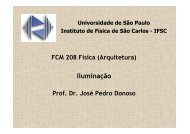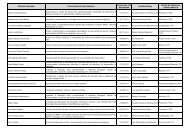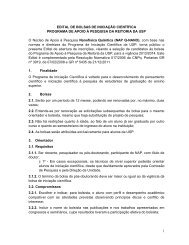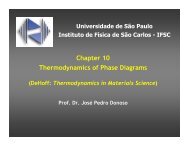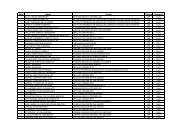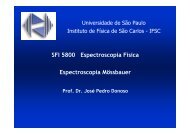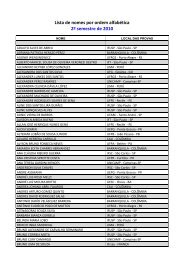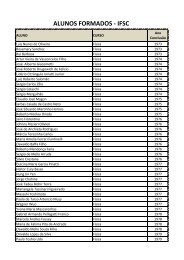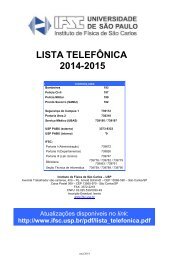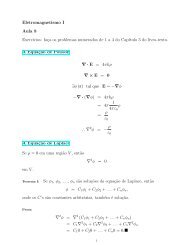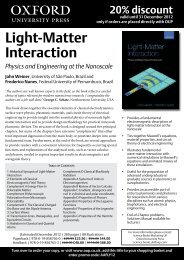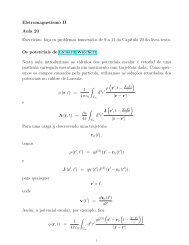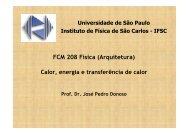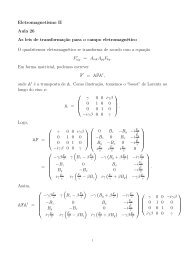PhD proposal in Theoretical Condensed Matter Physics - IFSC
PhD proposal in Theoretical Condensed Matter Physics - IFSC
PhD proposal in Theoretical Condensed Matter Physics - IFSC
You also want an ePaper? Increase the reach of your titles
YUMPU automatically turns print PDFs into web optimized ePapers that Google loves.
<strong>PhD</strong> <strong>proposal</strong> <strong>in</strong> <strong>Theoretical</strong> <strong>Condensed</strong> <strong>Matter</strong> <strong>Physics</strong><br />
Location : Laboratoire de Physique Théorique, Toulouse, France<br />
<strong>PhD</strong> advisor : Fabien Alet<br />
Email : alet@irsamc.ups-tlse.fr<br />
Phone : +33(0) 5 61 55 65 13<br />
Web: http://www.lpt.ups-tlse.fr/alet<br />
Measur<strong>in</strong>g entanglement of quantum systems with novel Quantum Monte<br />
Carlo algorithms<br />
Entanglement is probably the most prom<strong>in</strong>ent feature that allows to dist<strong>in</strong>guish quantum from<br />
classical systems. At the application level, it is a vital <strong>in</strong>gredient for newly developed quantum<br />
communication devices as entanglement is a resource for quantum <strong>in</strong>formation process<strong>in</strong>g. The<br />
field of quantum metrology, which aims at improv<strong>in</strong>g the precision of measurements of physical<br />
quantities, also heavily relies of entanglement properties of condensed-matter systems.<br />
At the fundamental level, the study of entanglement properties of quantum many-body states<br />
has recently shed new light on our understand<strong>in</strong>g of condensed matter systems at zero temperature.<br />
Let us mention the characterization of new states of matter (such as topological liquids 1 )<br />
or the detection of quantum phase transitions.<br />
Quantify<strong>in</strong>g how much entanglement is present <strong>in</strong> a system is however<br />
a difficult task, specially for many-body systems with an exponential<br />
number of degrees of freedom. Very recent breakthroughs<br />
2 <strong>in</strong> the numerical determ<strong>in</strong>ation of entanglement with<br />
Quantum Monte Carlo techniques are chang<strong>in</strong>g the situation.<br />
This <strong>PhD</strong> <strong>proposal</strong> aims at develop<strong>in</strong>g and improv<strong>in</strong>g on these recent<br />
developments, <strong>in</strong> the goal of provid<strong>in</strong>g a powerful tool for the<br />
characterization of entanglement of quantum many-body systems.<br />
Applications will be <strong>in</strong> the field of quantum magnets, superfluid<br />
systems, as well as quantum systems with <strong>in</strong>tr<strong>in</strong>sic disorder (such<br />
as quantum "superglasses", new states of matter with unusual physical<br />
properties).<br />
2<br />
=0<br />
A<br />
Illustration of the path <strong>in</strong>tegral<br />
formulation used to measure entanglement<br />
entropy <strong>in</strong> Quantum<br />
Monte Carlo.<br />
1 S.V. Isakov, M.B. Hast<strong>in</strong>gs, R.G. Melko, Nature <strong>Physics</strong> 7, 772 (2011)<br />
2 M.B. Hast<strong>in</strong>gs, I. Gonzalez, A.B. Kall<strong>in</strong>, R. G. Melko, Physical Review Letters 104, 157201<br />
(2010); S. Humeniuk and T. Roscilde, prepr<strong>in</strong>t arXiv:1203.5752 (March 2012)
The <strong>PhD</strong> student will benefit from the supervisor's expertise on implement<strong>in</strong>g large-scale, stateof-the-art<br />
Quantum Monte Carlo algorithms for quantum <strong>in</strong>formation properties of condensedmatter<br />
systems 3 , as well as from a strong condensed-matter community <strong>in</strong> Toulouse. The <strong>PhD</strong><br />
applicant should have a strong background <strong>in</strong> quantum mechanics and statistical physics. Experience<br />
with programm<strong>in</strong>g languages will be appreciated, but is not mandatory.<br />
Expected collaboration <strong>in</strong> Brazil :<br />
The <strong>PhD</strong> supervisor just started an ongo<strong>in</strong>g collaboration on the topic of quantum disordered<br />
systems with Brazilian condensed-matter theory groups, <strong>in</strong> particular with :<br />
- J.A. Hoyos, Instituto de Fisica de Sao Carlos, Universidade de Sao Paulo<br />
- E. Miranda, Instituto de Fisica Gleb Watagh<strong>in</strong>, Universidade Estadual de Camp<strong>in</strong>as<br />
- A.P. Vieira, Instituto de Fisica, Universidade de Sao Paulo.<br />
The entanglement approach developed <strong>in</strong> this <strong>PhD</strong> <strong>proposal</strong> will hopefully provide new <strong>in</strong>sights<br />
of these poorly understood states of matter. The numerical simulations proposed here will nicely<br />
complement the analytical techniques developed on the Brazilian side.<br />
Procedure for application :<br />
The application has to be made <strong>in</strong>dividually by the applicant through the programme Ciência<br />
sem fronteiras of the Brazilian government where this <strong>PhD</strong> <strong>proposal</strong> can be found (<strong>PhD</strong> <strong>proposal</strong><br />
<strong>in</strong> France, Université de Toulouse). More details at http://www.cienciasemfronteiras.gov.br.<br />
The applicant should feel free to also contact the <strong>PhD</strong> advisor (Fabien Alet,<br />
alet@irsamc.ups-tlse.fr) for any further scientific details.<br />
3 F. Alet, S. Capponi, N. Laflorencie and M. Mambr<strong>in</strong>i, Physical Review Letters 99, 117204<br />
(2007); D. Schwandt, F. Alet and S. Capponi, Physical Review Letters 103, 170501 (2009); A.F.<br />
Albuquerque, F. Alet, C. Sire and S. Capponi, Physical Review B 81, 064418 (2010)


